人教版高中英语必修一earthquake
人教版高中英语 必修一 Unit4 《EarthquakeReading》 课件 (共33张PPT)
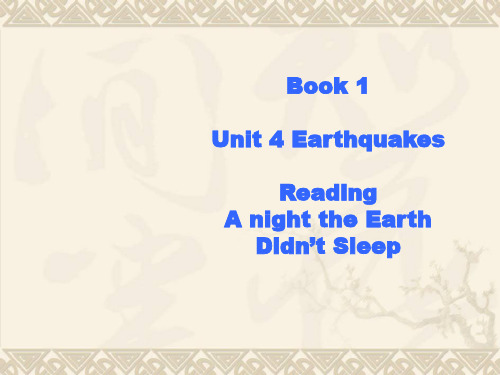
❖
Reao get the main idea.
Task 2
Divide the text into 3 parts.
❖Before the earthquake ❖During the earthquake ❖After the earthquake
Task 1
火山爆发
earthquake
❖
9、要学生做的事,教职员躬亲共做; 要学生 学的知 识,教 职员躬 亲共学 ;要学 生守的 规则, 教职员 躬亲共 守。21.8.1121.8.11Wednesday, August 11, 2021
❖
10、阅读一切好书如同和过去最杰出 的人谈 话。12:49:5012:49:5012:498/11/2021 12:49:50 PM
❖Before the earthquake ❖During the earthquake ❖After the earthquake
Part 1 (signs)
What are the signs before the earthquake?
Things
What happened
the water in the wells the well walls chickens & pigs mice fish in the sky the water pipes
Book 1
Unit 4 Earthquakes
Reading A night the Earth
Didn’t Sleep
How many natural disasters do you know?
flood drought
typhoon
fire
Tsunami (海啸)
高中英语必修一第四单元单词课件

(1) Ever since the earthquake, this temple has been in ruins . 自从地震以来,这座寺庙一直是废城一片。 (2) the ruins of an ancient castle 一座古代城堡的遗迹 (3) Heavy smoking may ruin yourself (you), so you should give it up as soon
查看答案
4 judge n.裁判员;法官 vt.断定;判断;判决
• judge sb. /sth. (to be)+n./adj.判断/认为/断定某人/某物(是)…… • judge...by/from...根据……判断…… • as far as I can judge据我判断 • judging by/from.d expression on her face.
查看答案
3 congratulation n.祝贺;(复数)贺词
※congratulations to sb. on sth. 为某事向某人祝贺 offer/express one’s congratulations to sb. 向某人表示祝贺
(1) On hearing the news, Mary burst into out crying (cry).
laughter while Lucy burst
一听到这则新闻,玛丽突然开始大笑起来,而露西则开始大哭起来。
(2) He burst into the room without knocking.
you will feel much frightened .(frighten)
当你站在高处看到令人恐惧的急流和瀑布时,你会感到非常害怕。
高中英语人教版必修一Unit4《Earthquakes》教案

Unit 4 Earthquakes1.Knowledge:Learn and master the new words and expressions in this period.Words:Ability:1.Train the students’ listening ability.2.train the students’ listening ability.3.Train the students’ ability to use the Internet to search for some usefulinformation.4.Train the students’ ability to cooperate with others.Emotion:1.Know the damage that an earthquake2.Know the ways to reduce the losses of an earthquake.Teaching important pointsTrain the students’ speaking ability by describing, talking and discussion. Difficulties:Train the students’ listening ability.Step1 Warming-upT:Do you know what happened in the Indian Ocean at the end of last year? It shocked or we can say frightened the whole world.S: A terrible tsunami broke out there on 26th December. More than 200 000 people were killed.T: Yes. It is said that it is the biggest in the fore decades. A tsunami is an undersea earthquake. Then have you heard of any land earthquakes? Would you please list some? 学.科.S: We can often hear that earthquakes occur in Japan. In 1906, an earthquake struck San Francisco, USA. About 700 people died in the earthquake and the fires. And as many as 250 000 people lost homes.T: But do you know any famous earthquakes that happened in our county?S: The Tangshan Earthquake that happened in 1976.T: Can you tell me what mighty happen in an earthquake? You may look at the two pictures on Page 25.Step 2 ListeningT: Before we learn the passage about an earthquake, let’s first know why there are earthquakes in the world. So let’s do some listening on Page 62. listen to the tape for the first time and try to get a general idea of the passage.Listen to the tape and check the answers.( It is about the cause of earthquakes and how we can reduce losses from them.)T: Listen to the tape for the second time and judge whether the statements in Part 1 are true of false.T: Let’s check the answers. Listen again and try to correct the statements that are false.T: Listen again and try to complete the table in Part 2.A few minutes later, check the answers. 学,科,网Z,X,X,K]Step 3 Homework1.Preview the reading passage on Page 26 and do exercise I in the part “Learningabout language”.2.Ask the to look for more ways of reducing losses from earthquakes. The studentscan go to the library or use the Internet to search for information. After searching for the information, each group should make a poster, informing people how to reduce the losses of an earthquake. 学_科_网Z_X_X_K]Record after teaching :_____________________________________________________________________ _____________________________________________________________________ _____________________________________________________________________ _____________________________________________________________________ _____________________________________________________________________ _____________________________________________________________________ _____________________________________________________________________ _____________________________________________________________________ _____________________________________________________________________The Second PeriodKnowledge:Learn some new, phrases and some new sentence patterns.Ability:1.learn some detailed information about an earthquake.2.improve the students’ reading ability.3.train the students’ ability to grasp key information while listening.4.train the students’ speaking ability.Emotion:1.Train the students’ ability to cooperate with others.2.Know the deadliness of an earthquake and the signs before an earthquake iscoming.3.Learn from the bravery of people in Tangshan to face the reality and rebuild thecity.Teaching important points:1 The new words and expressions.2. Learn some detailed information about an earthquake.3. Train the students’ ability to cooperate with others.4. Train the students’ speaking ability.Teaching difficulties:1 Words: shake, burst, rise, destroy, shock, fresh, injure2. Phrases: right away, at an end3. Sentence patterns:(1) It seemed/ seems that…(2) The number of sb./sth. Reached/reaches…(3)All hope was not lost.4. Improve the students’ reading ability.5. Train the students’ ability to grasp key information while listeningTeaching procedures:Step 1 Pre-readingT: Suppose you are warned of a coming earthquake. Now you have time to take only one thing. Tell your partner what you will take and the reason.T: If an earthquake is around the corner, there must be some abnormal phenomena. Carefully look at the four pictures on Page 25 and try to describe what you have seen. Step2 ListeningT: Everyone knows that an earthquake is very terrible. Today, we will learn something about the strongest earthquake in China’s history, which happened in Tangshan, Hebei, in 1976. First listen to the tape with your textbooks closed and check whether the following statements are true or false. If it is false, try to correct it.1.People in Tangshan were warned of the earthquake and didn’t go to bed that night.(F)2.People in Beijing also felt the earthquake. (T)3.More than 400 000 people were killed in the quake. (F)4.Many rescue workers and doctors were trapped under the ruins during theaftershock. (T)5.People tried to get fresh water from under the ground in Tangshan. (F)Step 3 Reading1.Finish Part 1-2 in Comprehending on Page 27.2.Finish Part 3 in Comprehending on Page 27.3.Read the passage again to get important information about Tangshan Earthquakeand fill in the blanks. ( 百思英语Page 44 )Step 4 Speaking or Reading aloudIf your students are good at English, ask them to do this exercise:Suppose one of you was a newspaper reporter, and the other was a witness of the 1976 Tangshan Earthquake. Now the newspaper reporter is asking the witness some questions. Work in pairs please.If your students are very poor in English, ask them to do this exercise:Play the tape for the students to listen and follow in order to let them know how to read the text.Step 5 Homework1.Read the text several times.2.Do exercise 3 on Page 28.3.Do exercise 2 on Page 28 in the exercise book and hang it in tomorrow.4.Learn some words and phrases in this unit and make some sentences with them.( Ss’ Book, Page 82-84)Record after teaching :_____________________________________________________________________ __________________________________________________________________________________________________________________________________________ ____________________________________________________________________ _____________________________________________________________________ _____________________________________________________________________ _____________________________________________________________________ _____________________________________________________________________ _____________________________________________________________________ _ZxxkThe Third PeriodKnowledge:1.words: crack, burst, ruin, injure, destroy, shock, last2.phrases: at an end, right away, dig out3.sentence patterns:All hope was not lost.Ability:1.Train the students’ ability to read different numbers in English.2.Learn the usage of some difficult words and expressions.3.Train the students’ ability to remove the difficulties while reading.Emotion:1.Train the students’ ability to cooperate with others.2.Know the deadliness of an earthquake and the signs before an earthquake iscoming.3.Learn from the bravery of people in Tangshan to face the reality and rebuild thecity.Teaching important points:1.Train the students’ ability to read different numbers in English.2.Train the students’ ability to cooperate with others.Teaching difficulties:1.The explanation of some difficult words and expressions.2.Train the students’ ability to remove the difficulties while reading.Teaching procedures:Step 1 Revision1.T: In the last period , we learned something about the terrible Tangshan Earthquake in 1976, which is the deadliest earthquake in China’s history. Now I am going to ask you some questions based on the Reading passage.(1)What did people in Tangshan see in the sky before the earthquake? 学|科|(2)What did people notice in the wells?(3)Did people pay any attention to these abnormal phenomena?(4)When did the earthquake begin?(5)Were there any aftershocks?(6)Did the survivors deny the city and go to live in other places?2. Check the homework (Ex2 on P28). Ask them to recite it after class.Step 2 Learning about NumbersTurn to Page 28 and look at Part 3. Match each word to the number that has the same meaning. Allow the students several minutes to finish the task. Check the answers. Step 3 Important pointsAsk the students to turn to Page 82. Ask some students to make some sentences with the words or phrases. Deal with some difficulties. You can add more phrases.Step 4 homeworkIn order to master the usage of these words and expressions, please do some related exercises.1.Finish off the two parts in Using Words and Expressions on Page 63.2.Translate the sentences on Page 63 into English. Write the English sentences inone of your exercise book and hand it in tomorrow.Record after teaching :_____________________________________________________________________ _____________________________________________________________________ _____________________________________________________________________ _____________________________________________________________________ _____________________________________________________________________ _____________________________________________________________________ _____________________________________________________________________ _____________________________________________________________________ _____________________________________________________________________The Fourth PeriodKnowledge: ZXXK]1.Learn the Attributive Clause.2.Learn the difference between Relative Pronouns for the Attributive Clauses. Ability:1.Learn to choose the correct Relative Pronouns for the Attributive Clauses.2.Train the students’ ability to report what others have said.Emotion;Train the students’ ability to cooperate with each other.Teaching important points:1.Learn the Attributive Clause.2.Train the students’ ability to report what others have said.Teaching difficulties:Learn to choose the correct Relative Pronouns for the Attributive Clauses.Teaching procedures:Step 1 revisionCheck the homework exercises.Step 2 Grammar( The teacher writes the sentence “ Workers built shelters for survivors whose homeshad been destroyed.” On the blackboard before class begins.)T: Please look at the sentence on the blackboard, paying special attention to the underlined part. What kind of clause is it?Ss: The Attributive Clause.T: Yes. The Attributive Clause tells us which person or thing (or what kind of person or thing ) the speaker means.e.g. The woman who lives next door is a teacher.A sen tence with an attributive clause contains two shorter sentences. In the sentence above, the two short sentences are: “The woman is a teacher.”And “The woman lives next door.” The Attributive Clause is the answer to the question: Which woman is a teacher?Would you try to divide the sample sentence on the blackboard into two short sentences?T: That’s right. Now try to find all the sentences with Attributive Clauses in the reading passage and divide each sentence into two short sentences.T: Next I will say s omething about the common relative pronouns.“Who”is used for people. “Which”is used for things. “That” is used for things or people. “Whose” is used instead of his/her/their/somebody’s. “Whom” is quite formal, and in most cases it is all right to use who instead. But when whom has a preposition before it, it cannot be replaced by who.Ste p 3 Practice1. Now look at Part 2 in Discovering Useful Structures on Page 28. try to complete each sentence using that, which, who, or whose.Let the students do this exercise and check the answers.2.Do more exercises in Ex 3 on Page51 in《导学》Step 4 HomeworkAfter class, read the passage on Page 64. It’s about advice on how to protect your home from an earthquake. Complete the sentences below, using who, whom, which, that or whose.Record after teaching;_____________________________________________________________________ _____________________________________________________________________ _____________________________________________________________________ _____________________________________________________________________ _____________________________________________________________________ _____________________________________________________________________ _____________________________________________________________________ _____________________________________________________________________ _____________________________________________________________________ .The Fifth PeriodKnowledge:1.Know how to write a speech.2.Know how to write a newspaper story.Ability:1.Train the students’ speaking ability.2.Train the students’ ability to search for doing something.3.Train the students’ ability to do things step by step.Emotion:1.Honor the great people of Tangshan.2.Learn to cooperate to each other.Teaching Important Points:1.Train the students’ speaking ability.2.Train the students’ ability to search for doing something.Teaching Difficulties:1.Know how to write a speech.2.Know how to write a newspaper story.3.Learn to cooperate to each other.Teaching Procedures:Step 1 RevisionT: In the last period, we learned the Attributive Clause and how to choose a proper relative pronoun. Now let’s check your homework exercises. Please open your textbooks and turn to Page 64. Look at Part 1 in Using Structures. I will ask some of you to read the sentences out.(The teacher corrects mistakes if there are any.)Step 2 Readi ng and WritingT: Read the letter on Page 29.In the blank at the beginning of the letter, write the last number of the year it is now. Then in the blank near the end of the letter, use a number to say how many years ago the quake happened.(After several minutes, the teacher checks the answers with the class.)T: Suppose you are the student who was invited to give the speech. What should you include in your speech?(Students give their different answers.)T: Y es, while writing, don’t forget to contain the information. Now I will give you 15 minutes to write the speech. You can follow the points in part 3 on this page. (While the students are writing, the teacher gets around the classroom and helps the students to deal with any difficulties that they have.)(After 15 minutes)T: Are there any volunteers to read his or her speech?( If there is nobody, the teacher asks one to read, and give some assessments.)Step 3 SpeakingT: Imagine that after your speech, Zhangsha asks you to give a short talk about the new stamps about Tangshan to honor the city. First, ask and answer the following questions in pairs.(1)What do these stamps show?(2)Do you think these stamps are very important and why?(3)Will you collect these stamps? Why and why not?(After the students ask and answer these questions in pairs.) 学科T: Now try to fill in the lines in the little talk. You can use some of the answers to the questions.T: Next I will ask one of you to read the little talk.Step 4 WritingT: By now you have learned writing a speech and a little talk. Now you are going to write an article for a newspaper about a special event that happed in your hometown. First, let’s learn some skills of writing news paper stories. Before you write, you should write an outline. This is very useful. Today, we will learn how to write an outline. Please turn to Page 31. Read the instructions in bold and pay attention to some questions I prepared to you.Q1: Why is an outline important?Q2: What should an outline include?Q3: Why is a headline important?Q4: What are the steps to finish a newspaper story?Q5: What is the feature of a newspaper story?Suggested answers:1.Because an outline will prepare you to write a better story.2. A good outline should have a headline, a list of main ideas and a list of importantdetails.3. A headline can tell the readers what the topic is, so it can attract the readers’attention since the reader may not have bought the newspaper before they read the headline.4.First, organize the main ideas. Next, put some details into each paragraph.5. A newspaper stor y gives the most important news first and the least importantnews last.T: Now let’s read the example of a newspaper story. Try to find the headline, main idea and details of each paragraph. You may work in groups of three.(After several minutes, the teacher asks the students the following questions :)Q1: What is the headline of the newspaper story?Q2: What is the main idea?Q3: What is the detailed information?T: Now turn to Page 32 and check your main ideals and detailed information.Step 5 HomeworkT: So now you know how to write a passage step by step. Prepare the outline for a short newspaper story for China Daily. Use the example to help you to organize your outline. You can first have a discussi on with your partner and decide which event you will write about. Try to write down the title, main ideas and detailed information. Then put them into a short passage.ZXXK]Record after teaching:_____________________________________________________________________ _____________________________________________________________________ __________________________________________________________________________________________________________________________________________ _____________________________________________________________________ _____________________________________________________________________ _____________________________________________________________________ _____________________________________________________________________ _____________________________________________________________________The Sixth PeriodKnowledge:Learn a passage about the San Francisco EarthquakeAbility:1. Learn to compare two similar passages.2. Train the students’ listening ability.Emotion:1. Learn to cooperate with others.2. Learn from the bravery of the people of San Francisco to face the reality. Teaching Important Points:1.Train the students’ listening ability.2. Learn a passage about the San Francisco EarthquakeTeaching Difficulties:Learn to compare two similar passages.Teaching Procedures:Step 1 RevisionT: In the second period of this unit, you learnt some detailed information about the Tangshan Eearthquake. Can you use several sentences to summarize the passage? S: Let me have a try. The terrible earthquake struck the city of Tangshan while people were sleeping. More than 400 000 people were killed or injured in the quake. After the quake, people found nearly everything was destroyed. But people in Tangshan didn’t lose heart. They rebuilt the city with the help of soldiers.T: Quite good. ZxxkStep 2 Reading and ComparingT: In the first period, we also talked about the earthquakes that happe ned in San Francisco. Today, we will learn a passage titled “The Story of an Eyewitness”, which is about the San Francisco Earthquake in 1906. It was written by Jake London, who was a famous American writer.T: First read the passage carefully. While reading, please think about the following questions:(1)How did the author feel about the earthquake?(2)How did the author feel about the people of San Francisco?(Ss read the passage, then the teacher asks someone to give their answers and checks the answers)(Answers will vary.)T: Quite good. You can keep your own answers as long as you think they are reasonable and you can find proofs from the passage.Read the first paragraph in this passage .Then go back and read again the first paragraph of the passage on Page 26. Compare the ways both writers give you details about the earthquakes. Try to finish the 4 exercises on Page 66. You may discuss i n group of three.(Ss read the two passage and finish the exercises.)(Then the teacher checks the answers.)T: Next I will play the tape of this passage for you to listen. Please pay special attention to the intonation.(After listening.)T: Now I will give you several minutes to read the third paragraph with feelings. Step 3 ListeningT: Just now we learned a passage written by an eyewitness about the terrible San Francisco earthquake in 1906. Now we will listen to a story told by a man who was a survivor of the earthquake. Listen to the tape the first time, and try to tell whether the statements in part 1 are true or false.(Teacher plays the tape for the students to listen and finish the task.)(After listening, the teacher checks the answers with the class.)T: Now let’s listen to the tape again and try to answer the questions in Part 2.(After listening, the teacher checks the answers) ZXXK]T: While listening to the tape, you should not only pay attention to the contents, but also the pronunciation and intonation. The sentences in Part 3 show us the sequence. I will play the tape again, you should mark liaison and incomplete explosion in these sentences. Then practice reading them aloud.Step 4 HomeworkT: In this class we read and listened to two stories ,both of which are about the 1906 San Francisco earthquake. The stories are true and were written for the Museum of the City of San Francisco. The museum has many such personal accounts and photos at /1906/06.html. If you are interested in them, you can surf in the site I’ve given to you.Record after teaching:_____________________________________________________________________ _____________________________________________________________________ _____________________________________________________________________ _____________________________________________________________________ _____________________________________________________________________ _____________________________________________________________________ _____________________________________________________________________ _____________________________________________________________________ _____________________________________________________________________The Seventh PeriodKnowledge:1.Learn how to make an earthquake plan.2.Learn what to contain in a personal earthquake bag.Ability:1.Train the students’ listening abil ity.2.T rain the students’ speaking ability.3.Learn to find reasons for their choices.4.Learn to sum up what they have learned in the unit.Emotion:Learn to coop erate with others.Teaching Important Points:1. Train the students’ listening ability.2. Tra in the students’ speaking ability.Teaching Difficulties:Learn to find reasons for their choices.Teaching Procedures:Step 1 GreetingsGreet the whole class as usual.Step 2 ListeningT: These days Earthquakes are always our central topic. We have learned many things about it. Up till now, earthquakes are difficult to predict. We can hardly avoid an earthquake. But actually we can do things to reduce the losses of an earthquake. Let’s look at the form on Page 66 and have a discussion about the earthquake plan with your partner.( Ss give their answers)T: What should you do if you are outside?(Ss give their answers)T: What should you do if you are in the living room?(different answers)T: What should you do if you are in the house room?(different answers)T: Next we are going to listen to the tape and write down the three “things” that are mentioned.(After listening, teacher checks the answers with the students.)T: Then let’s listen again. This time you should write down more details about each of th e “things”.(After listening, teacher checks the answers with the class. Play the tape again if necessary.)Step 3 SpeakingT: You know every family should have an earthquake bag, in which there are enough things that you can use in case of an earthquake. Here we have a list of possible items for the personal earthquake bag. Choose only eight things, which you think are the most essential, from the list. They must last you five days. Discuss with your partner.(After several minutes.)T: Now join another pair and discuss your choices. Put all the things you agree on into a final list. Discuss the other items explaining your reasons and trying to agree which ones are the most suitable.(After several minutes.)T: Each group should choose one representative. Now be prepared to present your list to the class and give your reasons for each choice.Step 4 Learning TipT: In order to learn a language well, you should do a lot of practice, including listening, speaking, reading and writing. Only when we understand what is said to us can we have a conversation with somebody. So listening to English is very important. After class, you should listen to the English news on CCTV International. You will not only get a lot of information about what is happening around the world, but also improve your listening and learn more English words and expressions. At the same, you will improve your pronunciation and intonation.Step 5 Summing upT: Now let’s sum up what you have learnt in this unit. Work with your partner. First write down what you have learned about earthquakes. Then write down the verbs, nouns, expressions and new grammar items that you have learned from this unit. Step 6 Homework1.Review Unit 4. .2.Preview Unit 5.Record after teaching:_____________________________________________________________________ _____________________________________________________________________ _____________________________________________________________________ _____________________________________________________________________ _____________________________________________________________________ _____________________________________________________________________ _____________________________________________________________________ _____________________________________________________________________ _____________________________________________________________________The End。
人教高中英语必修一unit4Earthquake课文翻译
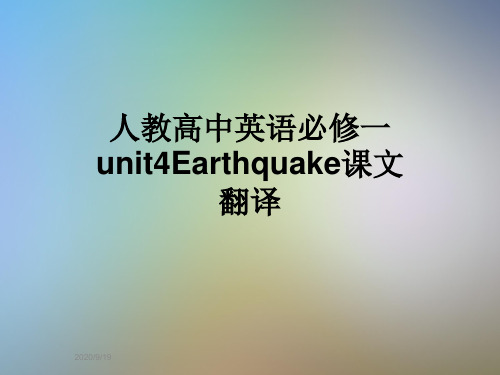
即使天空没有飞机,在唐山城外也可以听到飞机声。
In the city, the water pipes in some buildings cracked and burst. 在市内,有些建筑物里的水管爆裂开来。
所有的市内医院、75%的工厂和建筑物、90%的家园都消失了。
Bricks covered the ground like red autumn leaves.
残砖就像秋天的红叶覆盖着大地,
No wind, however, could blow them away.
然而它们是不可能被风刮走的。
Two dams fell and most of the bridges also fell or were not safe for traveling. 两座大坝垮了,多数桥梁不是塌了就是无法安全通行了。
Two-thirds of them died or were injured during the earthquake. 2/3的人在地震中死去或受伤。
Thousands of families were killed and many of them were left without parents
三天来,村子里的井水升升降降,起起伏伏。 Farmers noticed that the well walls had deep cracks in them.
农夫注意到,水井的井壁上有深深的裂缝,
A smelly gas came out of the cracks. 裂缝里冒出臭气。
人教版英语必修一Unit 4 Earthquake知识点总结详解整理
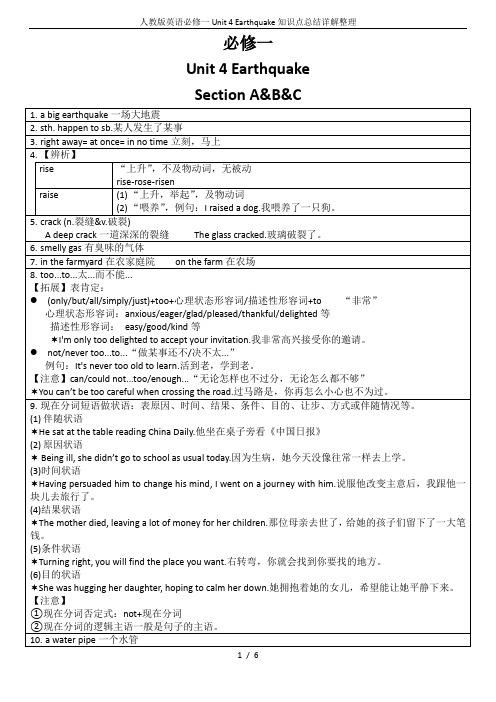
必修一Unit 4 Earthquake Section A&B&C11.burst➢v.(使)爆裂;(使)膨胀;爆发;burst-burst-burstThe water pipe cracked and burst.➢n.突发,爆发✶There was a burst of laughter in the next room.隔壁房间里突然爆发出一阵笑声。
➢v.猛冲;突然出现✶He burst into the room without knocking.他没敲门就闯进了房间。
【拓展】●burst into+名词=burst out doing 突然...起来✶burst into tears=burst out crying 突然哭起来/ burst into laughter=burst out laughing突然笑起来●burst in闯进●be bursting with充满;爆满✶The roads are bursting with cars.车辆把那些道路挤满了。
● a burst of (突然)一阵lion百万【用法】one million一百万several million几百万a dozen million一千两百万millions of+名词几百万...【其他数字用法】tens of thousands of...数以万计的...hundreds of thousands of...几十万【其他表示数字的词】dozen一打(十二) score(二十)13.event n.(1)事件;(尤指)大事●current/the latest events当前事件/最新事件(2)(体育比赛等的)项目,赛事●one of the major sporting events of the year年度重大体育赛事之一【辨析】event 重要事件;比赛项目The Asian Games were one of the major sporting eventsof the year.亚运会是年度重大体育赛事之一。
人教版高中英语必修一Unit4--Listeningppt课件

earthquake happened. T 2. Many huge buildings were shaking –
brickspeople were buried under the ruins.
3 Discuss this question in small groups:
Why do some earthquakes kill more people than others? ✓Some earthquakes are stronger. ✓Some houses are not built strongly enough to withstand earthquakes. ✓More people die if they do not know what to do when there is an earthquake.
2. Preview Writing on page 31, Speaking task and Writing task on page 67.
3 Listen to Part 1 again. Write down the three things to do to keep safe if there is an earthquake.
1st thing I must do :
I must drop to the floor and cover my head and neck with my arms.
If you are in the living room, you should make sure that the bookcases are fastened to the wall and the TV set is tied to a table so that they can’t move.
book1 unit4 Earthquakes 地震

Step 3. Careful reading
Read the est answers.
Step 3. Careful reading
1. Which of the following is NOT the reason that so many people were killed or injured in this disaster? A. It happened in the night and people were sleeping. B. The earthquake was one of the largest earthquakes ever. C. There was little water in the city. D. Two big quakes shook the city.
Step 6. Your show time
Choose a paragraph and act out an interview between a reporter and two survivors from the Tangshan earthquake.
Step 6. Your show time reporter
injure
破坏;毁坏;消灭
无用的;无效的 援救;营救 陷阱;困境
104
电;电流;电学
灾难;灾祸
dig out
bury
miner a number of reporter
408
congratulation
burst
million event
right away
高中英语人教版必修一Unit4Earthquakes单元教案
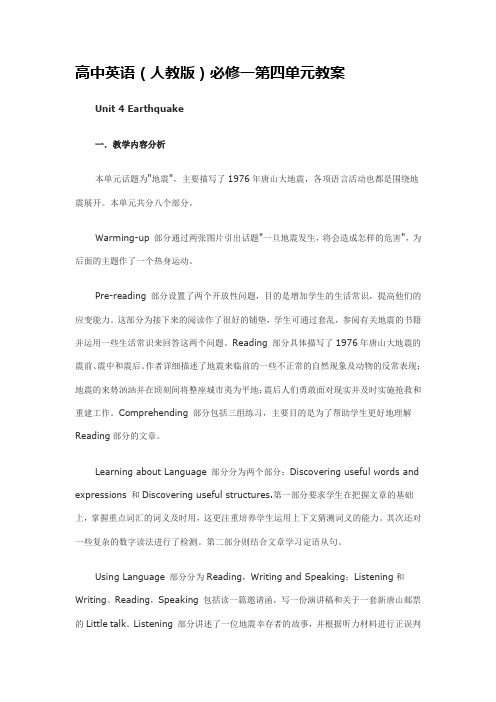
高中英语(人教版)必修一第四单元教案Unit 4 Earthquake一.教学内容分析本单元话题为"地震",主要描写了1976年唐山大地震,各项语言活动也都是围绕地震展开。
本单元共分八个部分。
Warming-up 部分通过两张图片引出话题"一旦地震发生,将会造成怎样的危害",为后面的主题作了一个热身运动。
Pre-reading 部分设置了两个开放性问题,目的是增加学生的生活常识,提高他们的应变能力。
这部分为接下来的阅读作了很好的铺垫,学生可通过套乱,参阅有关地震的书籍并运用一些生活常识来回答这两个问题。
Reading 部分具体描写了1976年唐山大地震的震前、震中和震后。
作者详细描述了地震来临前的一些不正常的自然现象及动物的反常表现;地震的来势汹汹并在顷刻间将整座城市夷为平地;震后人们勇敢面对现实并及时实施抢救和重建工作。
Comprehending 部分包括三组练习,主要目的是为了帮助学生更好地理解Reading部分的文章。
Learning about Language 部分分为两个部分:Discovering useful words and expressions 和Discovering useful structures.第一部分要求学生在把握文章的基础上,掌握重点词汇的词义及时用,这更注重培养学生运用上下文猜测词义的能力。
其次还对一些复杂的数字读法进行了检测。
第二部分则结合文章学习定语从句。
Using Language 部分分为Reading,Writing and Speaking;Listening和Writing。
Reading,Speaking 包括读一篇邀请函,写一份演讲稿和关于一套新唐山邮票的Little talk。
Listening 部分讲述了一位地震幸存者的故事,并根据听力材料进行正误判断和回答问题,旨在培养学生获取细节的能力,并通过听来模仿标准的语音和语调。
人教高中英语 必修一 unit4Earthquake课文翻译

即使天空没有飞机,在唐山城外也可以听到飞机声。
In city, the water pipes in some buildings cracked and burst. 在市内,有些建筑物里的水管爆裂开来。
Half a million pigs and millions of chickens were dead.
50万头猪和几百万只鸡全都死了。 Sand now filled the wells instead of water.
井里满是沙子,而不是水。 People were shocked. 人们惊呆了。
It seemed as if the world was at an end! 世界似乎到了末日!
Eleven kilometers directly below the city the greatest earthquake of the 20th century had begun.
二十世纪最大的一次地震就在唐山市正下方11公里处发生了。 It was felt in Beijing, which is more than two hundred kilometers away.
Then, later that afternoon, another big quake which was almost as strong as the first one shook Tangshan.
接着,在下午晚些时候,又一次和第一次一样的强烈的地震震撼着唐山。
人教版高中英语必修一课件:Unit 4 Earthquakes(共46张PPT)
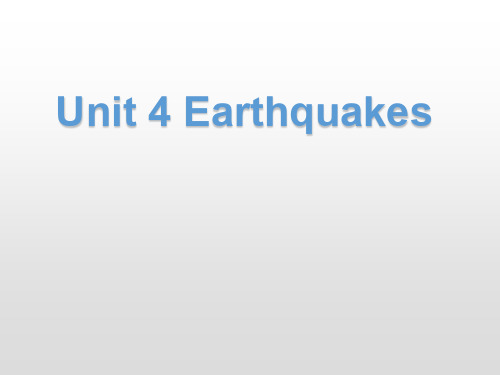
The world seemed at an end. Everything was destroyed.
__T_h__o_u_s_a_n__d_s_o__f__ families were killed and many children were left without parents.
Signs before the earthquake:
The water _____ in some buildings _p_ip_e_s__ and cracked _____b_u.rst
break
Part 2 Ruins
The damages caused during the earthquake.
After the earthquake
_s_e_n__t soldiers to Tangshan to
The
army:
rescue workers;
o_r_g_a_n_i_ze_d_ teams
to
_d_i_g__o_u_t
those who were trapped and to
bury the dead.
Part 3 (Para 4)
After the earthquake
rescue
Before the earthquake
sign
During the earthquake
damage
Structure of the whole passage :
order of the passage
time order
Disaster: A big earthquake
高中英语人教版-必修一Unit 4词汇表

必修一U n i t4词汇表e a r t h q u a k e['ə:θk w e i k]n.地震q u a k e[k w e i k]n.地震r i g h t a w a y立刻;马上w e l l[w e l]n.井∆c r a c k[k ræk]n.裂缝;噼啪声v t.&v i.(使)开裂;破裂∆s me l l y['s m e l i]a d j.发臭的;有臭味的∆f a r m y a r d['fɑ:m jɑ:d]n.农场;农家p i p e[p a i p]n.管;导管b u r s t[bə:s t]v i.爆裂;爆发n.突然破裂;爆发m i l l i o n['m i l jən]n.百万e v e n t[i'v e n t]n.事件;大事a s i f仿佛;好像a t a n e n d结束;终结n a t i o n['n e iʃən]n.民族;国家;国民c a n a l[kə'næl]n.运河;水道s t e a m[s t i:m]n.蒸汽;水汽d i r t[də:t]n.污垢;泥土r u i n['r u i n,'r u:-]n.废墟;毁灭v t.毁灭;使破产i n r u i n s严重受损;破败不堪s u f f e r i n g['sʌfər iŋ]n.苦难;痛苦e x t r e m e[i k's t r i:m]a d j.极度的i n j u r e['i n dʒə]v t.损害;伤害∆s u r v i v o r[sə'v a i və]n.幸存者;生还者;残存物d e s t r o y[d i's t rɔi]v t.破坏;毁坏;消灭b r ic k[b r i k]n.砖;砖块d a m[dæm]n.水坝;堰堤t r a c k[t ræk]n.轨道;足迹;痕迹u s e l e s s['j u:s l i s]a d j.无用的;无效的;无益的s h o c k[ʃɔk]v t.&v i.(使)震惊;震动n.休克;打击;震惊r e s c u e['r e s k j u:]n.&v t.援救;营救t r a p[t ræp]v t.使陷入困境n.陷阱;困境e l e c t r i c i t y[,i l e k't r i sət i]n.电;电流;电学d i s a s te r[,d i'zɑ:s tə]n.灾难;灾祸d i g o u t掘出;发现b u r y['b e r i]v t.埋葬;掩埋;隐藏m i n e[m a i n]n.矿;矿山;矿井m i n e r['m a i nə]n.矿工s h e l t e r['ʃe l tə]n.掩蔽;掩蔽处;避身处a(g r e a t)n u mb e r o f许多;大量的t i t l e['t a i t l]n.标题;头衔;资格r e p o r t e r[r i'pɔ:tə]n.记者b a r[bɑ:]n.条;棒;条状物d a m a g e['dæm i dʒ]n.&v t.损失;损害f r igh t e n['f r ai tən]v t.使惊吓;吓唬f r igh t e n e d['f r ai t n d]a d j.受惊的;受恐吓的f r igh t e ni n g['f r a i tən iŋ]a d j.令人恐惧的c o n g r a t u l a t i o n[kən,ɡrætʃu'l e iʃən]n.祝贺;(复数)贺词j u d g e[dʒʌdʒ]n.裁判员;法官v t.断定;判断;判决s i n c e r e l y[s i n's iəl i]a d v.真诚地;真挚地e x p r e s s[i k's p r e s]v t.表示;表达n.快车;速递o u t l i n e['a u t l a i n]n.要点;大纲;轮廓h e a d l i n e['h e d l a i n]n.报刊的大字标题c y c l i s t['s a i k l i s t]n.骑必修一U n i t5词汇表∆N e l s o n M a n d e l a['n e l s n mæn'd e lə]纳尔逊∙曼德拉(前南非共和国总统)q u a l i t y['k wɔlət i]n.质量;品质;性质∆w a r m-h e a r t e d[,wɔ:m'h a:t i d]a d j.热心肠的m e a n[mi:n]a d j.吝啬的;自私的;卑鄙的a c t i v e['æk t i v]a d j.积极的;活跃的g e n e r o u s['dʒe nərəs]a d j.慷慨的;大方的∆e a s y-g o i n g[,i:z i:'gəu iŋ]a d j.随和的;温和宽容的s e l f[s e l f]n.自我;自身s e l f i s h['s e l f iʃ]a d j.自私的s e l f l e s s['s e l f l i s]a d j.无私的;忘我的s e l f l e s s l y['s e l f l i s l i]a d v.无私地;忘我地d e v o t e[d i'vəu t]v t.(与t o连用)献身;专心于d e v o t e d[d i'vəu t i d]a d j.忠实的;深爱的∆Wi l l i a m T y n d a l e['w i l jəm't i n d l]威廉∙廷代尔(英国早期新教改革者)∆B i b l e['b a i b l]n.《圣经》∆N o r ma n B e t h u n e['Nɔ:mən bə'θj u:n]诺曼∙白求恩(加拿大胸外科医师)∆i n v a d e r[i n'v e i də]n.侵略者f o u n d[f a u n d]v t.建立;建设r e p u b l i c[r i'pʌb l i k]n.共和国;共和政体p r i n c i p l e['p r i n səp l]n.法则;原则;原理∆n a t i o n a l i s m['næʃənəl i zəm]n.民族主义;国家主义∆l i v e l i h o o d['l a i v l i h u d]n.生计;谋生∆M o h a n d a s G a n d h i[məu'hæn dəs'gæn d i]莫罕达斯∙甘地(印度国民大会党领袖)p e a c e f u l['p i:s f u l]a d j.和平的;平静的;安宁的∆g i a n t['dʒa iən t]a d j.巨大的;庞大的∆l e a p[l i:p]n.飞跃;跳跃ma n k i n d[,mæn'k a i n d]n.人类∆E l i a s[i'l a iəs]伊莱亚斯(男名)l a w y e r['lɔ:jə]n.律师g u i d a n c e['ɡa i dən s]n.指导;领导l e g a l['l i:ɡəl]a d j.法律的;依照法律的f e e[f i:]n.费(会费;学费等);酬金∆p a s s b o o k['pɑ:s b u k]n.南非共和国有色人种的身份证∆J o h a n n e s b u r g[dʒəu'hæn i s bə:g]约翰内斯堡(南非城市)o u t o f w o r k失业h o p e f u l['həu p f u l]a d j.有希望的∆A N C非国大;非洲人国民大会;非洲民族会议y o u t h[j u:θ]n.青年;青年时期l e a g u e[l i:ɡ]n.同盟;联盟;联合会Y o u t h L e a g u e青年团s t a g e[s t e i dʒ]n.舞台;阶段;时期v o t e[vəu t]v t.&v i.投票;选举n.投票;选票;表决a t t a c k[ə'tæk]v t.进攻;攻击;抨击v i o l e n c e['v a iələn s]n.暴力;暴行a s a ma t t e r o f f a c t事实上b l o wu p使充气;爆炸e q u a l['i:k wəl]a d j.相等的;平等的i n t r o u b l e在危险;受罚;痛苦;忧虑等的处境中w i l l i n g['w i l iŋ]a d j.乐意的;自愿的u n f a i r[,ʌn'fεə]a d j.不公正的;不公平的t u r n t o求助于;致力于∆q u o t e[k wəu t,kəu t]n.引用语;语录∆r e l e a s e[r i'l i:s]v t.释放;发行l o s e h e a r t丧失勇气或信心∆R o b b e n I s l a n d[lɔbən'a i lən d]罗本岛e s c a p e[i's k e i p]v i.逃脱;逃走;泄露b l a n k e t['b læŋk i t]n.毛毯;毯子e d u c a t e['e d j u:k e i t]v t.教育;训练e d u c a t e d['e d j u:k e i t i d]a d j.受过教育的;有教养的c o me t o p o w e r当权;上台b e g[b eɡ]v i.请求;乞求r e l a t i v e['r e lət i v]n.亲戚;亲属t e r r o r['t e rə]n.恐怖;可怕的人;恐怖时期;恐怖活动c r u e l t y['k r u:əl t i]n.残忍;残酷r e w a r d[r i'wɔ:d]n.报酬;奖金v t.酬劳;奖赏∆T r a n s k e i[t ræn s'k a i]特兰斯凯(南非东南部一地区)s e t u p设立;建立s e n t e n c e['s e n tən s]v t.判决;宣判b e s e n t e nc ed t o被判处……(徒刑)a n t i-['æn t i,-t a i][前缀]反;抗;阻a n t i-b l ac k['æn t i-b læk]ad j.反黑人的∆C a p e T o w n开普敦(南非立法首都)p r e s i d e n t['p r e z i dən t]n.总统;会长;校长;行长∆N o b e l P e a c e P r i z e[nəu'b e l'p i:s'p r a i z]诺贝尔和平奖。
人教高中英语 必修一 unit4Earthquake课文翻译

To the north of the city, most of the 10,000 miners were rescued from the coal mines there. 在唐山市的北边,有一个万名矿工的煤矿,其中多数人得救了。
Workers built shelters for survivors whose homes had been destroyed. 援救人员为那些家园被毁的幸存者盖起了避难所,
Half a million pigs and millions of chickens were dead.
50万头猪和几百万只鸡全都死了。 Sand now filled the wells instead of water.
井里满是沙子,而不是水。 People were shocked. 人们惊呆了。
Fresh water was taken to the city by train, truck and plane. 用火车、卡车和飞机向市内运来了水。
Slowly, the city began to breathe again. 慢慢地、慢慢地,这座城市又开始出现了生机。
Then, later that afternoon, another big quake which was almost as strong as the first one shook Tangshan.
接着,在下午晚些时候,又一次和第一次一样的强烈的地震震撼着唐山。
Some of the rescue workers and doctors were trapped under the ruins. 有些医生和救援人员被困在废墟下面。
老鼠从田地里跑出来找地方藏身。
Unit 4 Earthquake 课件(35张PPT)必修一英语(人教版)

3. Use one noun and preposition(介词)to
describe the main idea of each part.
noun
preposition
Part 1 signs
before the earthquake
Part 2 Part 3
damag e recovery /rescue
1. What can you see in the picture?
Many young people are praying for the dead in Wenchuan earthquake.
2. Do you think how destructive(毁灭性的) Wenchuan earthquake was ?
_____________ ________ ___
them and
w__e__n__t__t_o___s_ _l_e__e__p_____ as usual.
反义词think highly of
Mr Xi thought highly of me in my dream last night.
Read Para: (2-3) Find out the data (数据) to describe how destructive the earthquake was during the earthquake
B. Try to forget _____s_a_d___ experiences(经
历).
C. Live with a strong belief that _t_o_m__o_r_r_o__w__w_ i_l_l_ b_e__b__e_t_t_e_r_.
人教版 高中英语 必修一 Unit 4 Earthquakes 单词课件 44PPT
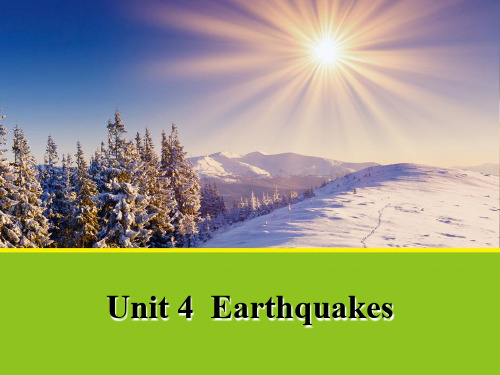
Unit 4 Earthquakes
Words and Expressions
1. earthquake n. 地震;大动荡 /ˈɜːθkweɪk/ 复数 earthquakes
2. quake /kweɪk/
n. 震动;震荡 vi.震动,颤抖,哆嗦
3. right away 立刻;马上
3) frighten sb/sth off 吓走,吓跑 4) frighten sb away 吓走
frightening frightened
adj. 令人恐惧的 adj. 受恐吓的,受惊吓的
1) be frightened of (doing) sth. 害怕(做)某事
2) be frightened at/by sth. 因某事而害怕
2) There were millions of people there. 那里人山人海。
3) Two million pounds was withdrawn from the account.
两百万英镑从该账户中被提取。
11. event n. 事件; 大事; 比赛项目 /ɪˈvent/
incident:意为"事件,事变",用于表示突发事件或
22. survivor n. 幸存者;生还者
/səˈvaɪvə/ survive v.幸存
He was the only survivor of the earthquake. 他是地震唯一的幸存者
23. destroy vt. 破坏;毁坏;消灭 /dɪˈstrɔɪ/
destruction n.破坏;毁坏;消灭
The earthquake almost completely destroyed the city. 地震几乎彻底毁了这座城市。
人教版英语必修一第四单元Earthquake知识点教案

人教版英语必修一第四单元Earthquake教案一、高级词汇二、超级短语选择适当的短语填空(注意所填短语的形式变化):1 Lily __________________her books in Spark Education on Friday night.2 The economy was__________________after the war.3 The firemen ___________a baby __________the burning house.4 The other scientists __________________________his theory.5 Why did you ________________these old books?6 People_________________________the rain in the supermarket.7 It seems ______________nothing has happened.8 The games we’ve played till now are_________________________.9 They ran up a flag___________________the chairman’s visit.10 After class, he left the school_____________________.11 He is a man of the world, he wouldn't ____________________.12 Do not _____________ your credit card info unless it is a secure site.13 A word of encouragement might have made me respect___________________ hate him.三、高分必背秘诀1.【原句】It seemed as if the world was at an end! 世界似乎到了末日![模仿要点] 句子结构:It seems ( to sb.) as if / that…【模仿1】似乎春天已经来了。
高中英语人教版必修一教案Unit 4 Earthquakes
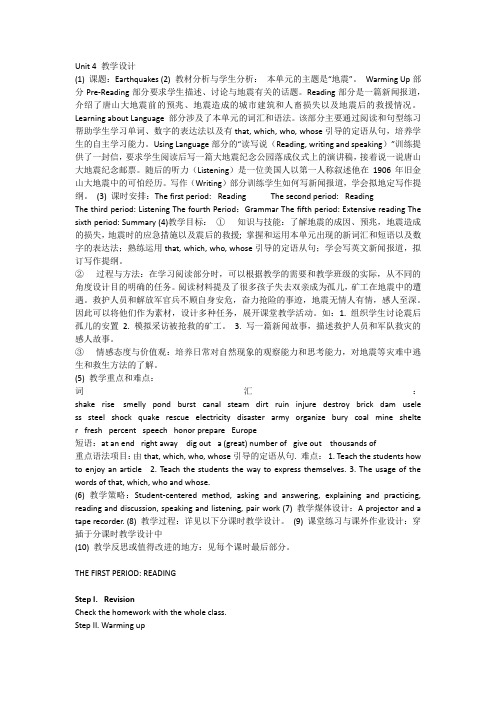
Unit 4 教学设计(1) 课题:Earthquakes (2) 教材分析与学生分析:本单元的主题是“地震”。
Warming Up部分Pre-Reading部分要求学生描述、讨论与地震有关的话题。
Reading部分是一篇新闻报道,介绍了唐山大地震前的预兆、地震造成的城市建筑和人畜损失以及地震后的救援情况。
Learning about Language 部分涉及了本单元的词汇和语法。
该部分主要通过阅读和句型练习帮助学生学习单词、数字的表达法以及有that, which, who, whose引导的定语从句,培养学生的自主学习能力。
Using Language部分的“读写说(Reading, writing and speaking)”训练提供了一封信,要求学生阅读后写一篇大地震纪念公园落成仪式上的演讲稿,接着说一说唐山大地震纪念邮票。
随后的听力(Listening)是一位美国人以第一人称叙述他在1906年旧金山大地震中的可怕经历。
写作(Writing)部分训练学生如何写新闻报道,学会拟地定写作提纲。
(3) 课时安排:The first period: Reading The second period: ReadingThe third period: Listening The fourth Period:Grammar The fifth period: Extensive reading The sixth period: Summary (4)教学目标:①知识与技能:了解地震的成因、预兆,地震造成的损失,地震时的应急措施以及震后的救援; 掌握和运用本单元出现的新词汇和短语以及数字的表达法;熟练运用that, which, who, whose引导的定语从句;学会写英文新闻报道,拟订写作提纲。
②过程与方法:在学习阅读部分时,可以根据教学的需要和教学班级的实际,从不同的角度设计目的明确的任务。
人教版高中英语必修一 Unit 4 Earthquakes Reading 课件(共27张PPT)

Two-thirds of the people died or 12
_w_e_r_e_in_j_u_r_e_d_. Then later that afternoon, another big quake 13 _s_h_o_o_k_ Tangshan.
People began to wonder 14
Sum up the main idea of each paragraph. (use one word to describe it)
Para1 Para 2&3
Detailesidgns readingdamages
Para 4
recovery
Para 1 Main Idea
Details
Unit 4
Earthquake
Reading
volcano
typhoon
natural disasters
flood
earthquake
earthquake
fire …
flood
drought
[tsuː'nɑːmi]
[draʊt]
tsunami
natural disasters
海啸
typhoon
Damage began .
caused by 13_______ burst from holes in earthquake the ground.
Para. 2-3 Part 2
Hard hills of the rock became rivers of 14 ____.
15 ________ covered the ground like red autumn leaves.
高一(上)英语必修一Unit4-Earthquakes重点单词短语归纳整理
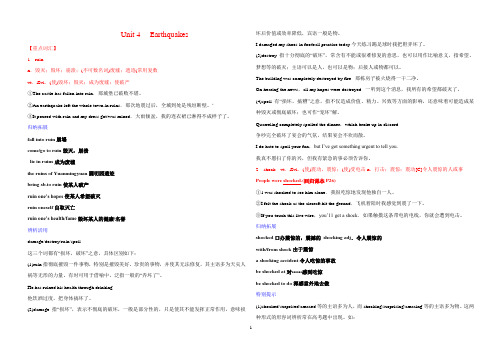
Unit 4 Earthquakes【重点词汇】1 ruinn.毁灭;毁坏;崩溃;(不可数名词)废墟;遗迹(常用复数vt.&vi.(使)毁坏;毁灭;成为废墟;使破产①The castle has fallen into rain.那城堡已破败不堪。
②An earthquake left the whole town in ruins.那次地震过后,全城到处是残垣断壁。
‘③It poured with rain and my dress got/was mined.大雨倾盆,我的连衣裙已淋得不成样子了。
归纳拓展fall into ruin崩塌come/go to ruin毁灭,崩溃lie in ruins成为废墟the ruins of Yuanmingyuan圆明园遗迹bring sb.to ruin使某人破产ruin one’s hopes使某人希望破灭ruin oneself自取灭亡ruin one’s health/fame毁坏某人的健康/名誉辨析活用damage/destroy/ruin/spoil这三个词都有“损坏,破坏”之意,具体区别如下:(1)ruin指彻底摧毁一件事物,特别是摧毁美好、珍贵的事物,并使其无法修复,其主语多为天灾人祸等无形的力量。
有时可用于借喻中,泛指一般的“弄坏了”。
He has ruined his health through drinking.他饮酒过度,把身体搞坏了。
(2)damage指“损坏”,表示不彻底的破坏,一般是部分性的,只是使其不能发挥正常作用,意味损坏后价值或效率降低,宾语一般是物。
I damaged my shoes in football practice today.今天练习踢足球时我把鞋弄坏了。
(3)destroy指十分彻底的“破坏”,常含有不能或很难修复的意思,也可以用作比喻意义,指希望、梦想等的破灭;主语可以是人,也可以是物;后接人或物都可以。
人教版高中英语必修一_Unit_4_Earthquakes_PPT课件
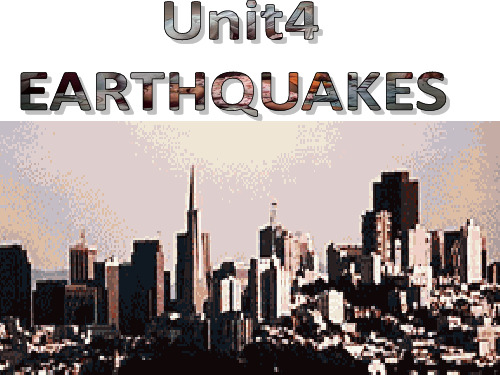
The buildings fell down(倒下) .
buildings
bridge
railway
Many things were destroyed, such as …
road
The cracks(裂缝)
cut across(横断,截断 )the roads .
The city lay in ruins after the earthquake . * Lie in ruins: 变成废墟
What do you think may happen before an earthquake?
People could see _b__ri_g_h_t_lights in the sky.
Unit4 earthquake
Scanning
Where :__T_an_g_s_ha_n______ When :_A_t 3_:4_2_am__on_J_ul_y _28_,1_97_6
3 Everywhere they looked nearly everything was destroyed.
4 All hope was not lost.
beginning beginning
Divide this passage into three parts
Part 1: para 1
Part 1
: Before the earthquake
Things water in the well well walls chickens and pigs
mice fish sky
sound water pipes
What happened rose and fell deep cracks, smelly gas
- 1、下载文档前请自行甄别文档内容的完整性,平台不提供额外的编辑、内容补充、找答案等附加服务。
- 2、"仅部分预览"的文档,不可在线预览部分如存在完整性等问题,可反馈申请退款(可完整预览的文档不适用该条件!)。
- 3、如文档侵犯您的权益,请联系客服反馈,我们会尽快为您处理(人工客服工作时间:9:00-18:30)。
The world seemed at an end. Everything was destroyed.
Use five sentences to rewrite the passage in your own words.
warning signs before an earthquake
* well water… * well walls … *a smelly gas…
warning signs before an earthquake
* animals: chickens and pigs/mice and fish … * in the sky: bright lights/the sound… * water pipes:
long ago? 4. Do you know when the earthquake
happened? 5. What happened to the county after the
earthquake?
Since the results are terrible, if there is an earthquake now and everything begins to shake, what will you do?
Skimming
1.When and where did the earthquake happen? At 3:42 am on July 28, 1976 in Tangshan.
2.2. What were Tangshan people doing when the earthquake happened? They thought little of these events, were asleep as usual that night.
the earthquake. ★ The number of people who were killed or injured
reached more than __4_0_0_,_0_0_0__. ★ All of the city’s hospitals,7_5_%____of its factories
_i_n_ju_r_e_d_. Then later that afternoon, another big quake s_h_o_o_k_ Tangshan. People began to wonder how long _t_h_e_d_i_sa_s_t_e_r_w__o_u_ld__la_s_t_. But _a_l_l _h_o_p_e_ was not lost. Soldiers came to help those _s_u_r_v_iv_o_r_s_. Slowly, the city began to __b_r_e_a_th_e__again.
and buildings and __9_0_%__of its homes were gone.
It was the greatest earthquake of the 20th century.
Part III (Para.4)
Main idea:
_T_h_e__a_r_m_y_ came to help the survivors, bringing _h_o_p_e_ for a new life.
Paragraph 2 Paragraph 3
Part 3 Paragraph 4
Part I (Para.1)
Main idead in Tangshan b__ef_o_r_e_ the earthquake.
What are the strange things before the earthquake?
Part II (Para.2--3): Data(数据)
★ __1_/_3_of the nation felt the earthquake . ★ A huge crack that was ___8__ kilometers long and
__3_0__ meters wide cut across houses, road, canals. ★ In __1_5__ terrible seconds a large city lay in ruins. ★ __2_/3_ of the people died or were injured during
Part II (Para.2--3) Main idea:
The_d_a_m__a_g_ecaused by the earthquake.
Part II (Para.2--3): detail reading
★__S_t_e_a_m_ burst from holes in the ground. ★Hard hills of the rock became rivers of _d__ir_t. ★_B_r_i_c_k_scovered the ground like red autumn leaves. ★ Two __d_a_m__s_ and most of the bridges fell. ★The railway tracks were now ___u_s_e_le_s_s_ pieces
Consolidation: Retell the passage
S_t_r_a_n_g_e_t_h_i_n_g_s happened in Tangshan. For a few
days, water in the wells _r_o_s_e_a_n_d__fe_l_l_. From the _c_r_a_ck__s of wells _s_m_e_l_ly__g_a_s_came out. Mice, chicken, pigs and even fish became _n_e_r_v_o_u_s_. But the people in Tangshan _t_h_o_u_g_h_t_l_it_tl_e_o_f__ these events. At 3:00 am, everything began to _s_h_a_k_e_. It seemed that the world was _a_t_a_n__e_n_d_. _O_n__e-_t_h_ir_d_ of the nation felt it. A huge _c_ra_c_k_ cut across the city, then the city lay _in__r_u_in_s_. Two-thirds of the people _d_i_e_d_or were
Part III (Para.4): detail reading
What did they do for the city?
Firstly, _d_i_g_o_u__t _…__&__b_u_r_y_._.._ secondly,_r_e_s_c_u_e_t_h_e_c_o_a_l_m__in__er_s_ thirdly, _b_u_i_ld__s_h_e_lt_e_r_s_f_o_r_s_u_r_v_i_vors the last, _t_r_a_n_s_p_o_r_t _th_e__w_a_t_e_r____
高中英语课件
(madeofdingshangtuwen)
1. Have you ever heard of the county of Wenchuan? 2. Where does the county of Wenchuan lie? 3. Do you know what happened there not
Listening and Reading
Listen to the tape and divide the passage into three parts, then think about the main idea of each part.
Part 1 Paragraph 1
Part 2
